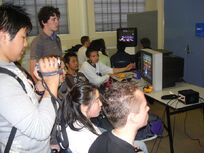No edit summary |
mNo edit summary |
||
| (2 intermediate revisions by 2 users not shown) | |||
| Line 1: | Line 1: | ||
:''This article is about players of the [[Super Smash Bros. series]]; for the playable characters in said series, go [[Smasher (character)|here]].'' |
:''This article is about players of the [[Super Smash Bros. series]]; for the playable characters in said series, go [[Smasher (character)|here]].'' |
||
| − | A '''smasher''' refers to a dedicated player of any Super Smash Bros. game, though the term came into regular use in competitive ''[[Super Smash Bros. Melee|Melee]]''. Although even casual Smash Bros. players can be considered smashers, the term is mostly used in the |
+ | A '''smasher''' refers to a dedicated player of any Super Smash Bros. game, though the term came into regular use in competitive ''[[Super Smash Bros. Melee|Melee]]''. Although even casual Smash Bros. players can be considered smashers, the term is mostly used in the Smash community when talking about competitive players and professionals, especially those who compete in local or regional tournaments. |
[[Image:Seat51ds.jpg|thumb|204px|right|A crowd of smashers gathered around the TV for the Australian tournament, SEAT.]] |
[[Image:Seat51ds.jpg|thumb|204px|right|A crowd of smashers gathered around the TV for the Australian tournament, SEAT.]] |
||
==Competitive scene== |
==Competitive scene== |
||
| − | Many smashers have earned recognition by participating in (or hosting) unofficial tournaments, mainly for ''Melee''. These tournaments have allowed smashers around the world to connect with others and make a name for themselves in the |
+ | Many smashers have earned recognition by participating in (or hosting) unofficial tournaments, mainly for ''Melee''. These tournaments have allowed smashers around the world to connect with others and make a name for themselves in the Smash community, as well as test their skills and possibly earn prizes. |
| − | The competitive community expanded to gain national recognition over the course of its golden age from 2003 right up to the 2008 release of ''[[Super Smash Bros. Brawl|Brawl]]''. Fuelled by unprecedented enthusiasm from players around the world, the game earned a position in the |
+ | The competitive community expanded to gain national recognition over the course of its golden age from 2003 right up to the 2008 release of ''[[Super Smash Bros. Brawl|Brawl]]''. Fuelled by unprecedented enthusiasm from players around the world, the game earned a position in the Major League Gaming roster of events and thousands of dollars were awarded to top players at both MLG-sanctioned tournaments, as well as other tournaments organized by local community figureheads. |
[[Category:Terms]] |
[[Category:Terms]] |
||
Latest revision as of 18:09, 7 March 2019
- This article is about players of the Super Smash Bros. series; for the playable characters in said series, go here.
A smasher refers to a dedicated player of any Super Smash Bros. game, though the term came into regular use in competitive Melee. Although even casual Smash Bros. players can be considered smashers, the term is mostly used in the Smash community when talking about competitive players and professionals, especially those who compete in local or regional tournaments.

A crowd of smashers gathered around the TV for the Australian tournament, SEAT.
Competitive scene
Many smashers have earned recognition by participating in (or hosting) unofficial tournaments, mainly for Melee. These tournaments have allowed smashers around the world to connect with others and make a name for themselves in the Smash community, as well as test their skills and possibly earn prizes.
The competitive community expanded to gain national recognition over the course of its golden age from 2003 right up to the 2008 release of Brawl. Fuelled by unprecedented enthusiasm from players around the world, the game earned a position in the Major League Gaming roster of events and thousands of dollars were awarded to top players at both MLG-sanctioned tournaments, as well as other tournaments organized by local community figureheads.
